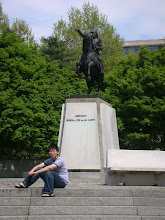
Dear Sirs and Madams,
Adam Smith noted that greater damage is incurred when governments go out of their way to remedy the dearth of goods. But what should be done when the people’s representatives choose to continue government intervention in the market? Should those that “know better” overturn the democratic principles and pursue what they know to be in the best interest of the people? This question has sparked many passionate debates amongst my friends and colleagues. I wish to present to you why I believe that no matter what the situation the democratic system must be upheld and sustained
The great liberal philosopher Isaiah Berlin noted that those promoting liberty must never come to believe it to be an absolute idea, for such dogmatism makes the actors vulnerable to violence and coercion. I am in concert with Sir Berlin. The end should never justify the means. Even if the state does not go as far as outright killing people, the devaluation of individuals and their thoughts will have ghastly consequences. Russia provides a perfect example of this case.
While forwarding major reforms to liberalize the market, Boris Yeltsin faced opposition from the parliament. After a tussle over authority, Yeltsin opted to use the military to silence the popularly elected parliament in 1993. The repression allowed the liberal market policies to be further implemented in Russia. Vladimir Putin inherited this blatant disregard for the democratic system of governance and further concentrated power around the executive while diminishing the voice of the people.
One of the many consequences from the Yeltsin/Putin years (Yeltsin and Putin’s joint legacy… I argued in my last article that they are really two peas in a pod) is the intensification of the demographic crisis. The people, suffering from disease and pollution, cannot elect into office someone who would bring them the necessary services to battle diseases like AIDS. State regulated television, with limits to the amount of “negative news” it can air, further impedes vital news and information regarding disease prevention. The money that should be going to enhancing the public’s health has been drained into the military to wage another unnecessary cold war with the west. The policy of “government-knows-best” has turned into a direct roadblock to the survivability of the Russian people.
Both Yeltsin and Putin may have achieved short term successes in pushing forth reforms and establishing some façade of law and order. Nonetheless, whatever good they achieved cannot outweigh the crisis that these two leaders have allowed to amplify.
By ignoring the democratic system, the Russian government has created an unintended consequence. A consequence that Adam Smith had long talked about.
I hope I made my case clear.
Best,
Yong Kwon

p.s. The New Yorker had an article that intensively discussed the demographic crisis.

hi
ReplyDelete